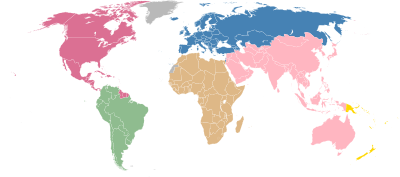Copa Libertadores
| Founded | 1960 |
|---|---|
| Region | South America (CONMEBOL) |
| Number of teams | 32 (Group stage) 38 (Total) |
| Current champions | |
| Most successful club | |
| Website | Copa Libertadores |
The Copa Santander Libertadores, also known as Copa Libertadores de América, (Portuguese: Taça Libertadores da América) is a football cup competition played annually by the top clubs of South America, while in recent editions, top clubs from Mexico have also been invited to compete. The tournament is organized by the Confederación Sudamericana de Fútbol/Confederação Sul-Americana de Futebol (CONMEBOL). In recent years, the preliminary rounds usually commence in late January or early February, and the finals are contested around late June, July or August. The champions represent CONMEBOL in the FIFA Club World Cup.
The current champion is the Ecuadorian club LDU Quito, while Argentine club Independiente is the most successful club in the cup history, having won the tournament for 7 times. The Copa Libertadores has also produced the most world club champions out of any FIFA confederation.
The name of the tournament is an homage to the Libertadores (Portuguese and Spanish words for Liberators), the main leaders of the independence wars of Latin America: Simón Bolívar, José de San Martín, Antonio José de Sucre, Bernardo O'Higgins, José Miguel Carrera and José Gervasio Artigas. Teams in contention for the title are referred to have the Sueño Libertador, in Hispanic America, or Projeto Tóquio, in Brazil.
Spain's largest bank Banco Santander has announced in September 2007 that it has signed an agreement with the CONMEBOL to become the new top sponsors of the competition.
Contents |
Format
Qualifying


In the beginning, only the national champions of the major South American federations (namely Argentina, Bolivia, Brazil, Chile, Colombia, Ecuador, Paraguay, Peru and Uruguay) would play in the Libertadores Cup, but in the 1970s a second team from each country was allowed entry and also teams from Venezuela. The number of participants was later increased to 24, 28, 32 and now 38.
Teams are qualified for the Libertadores Cup by winning a national championship or by finishing among the first few teams in the championship. Brazil, Uruguay and Mexico are the only countries participating which employ a second tournament that qualifies for the Libertadores (in Brazil, Copa do Brasil, since 1989; in Uruguay the "liguilla pre-libertadores" since 1974, in Mexico, the InterLiga since 2004).
The 2007 edition has the competitors distributed this way:
- The previous year's champion
- 5 from Argentina and Brazil, respectively
- 3 from Bolivia, Chile, Colombia, Ecuador, Paraguay, Peru, Uruguay, and Venezuela each
- 3 invitees from Mexico
Preliminary rounds, group stage and knockout stage
The Cup has a preliminary round in which a number of clubs, currently 12, are paired in a series of two-legged knockout ties. The six survivors join the remaining clubs in the first round, in which they are divided into groups of four. The first-round groups play in a league system, with each team playing home and away against each other team. The top two teams from each group are then drawn in the second round, which consists of a two-legged knockout tie. From that point, the competition proceeds with two-legged knockout ties to quarterfinals, semifinals, and the final. Between 1960 and 1987 the previous winners did not enter the competition until the semi-final stage (which was 2 group stage of 3 teams each one), making it much easier to retain the cup.
Rules
Note that unlike European club competitions, the Copa Libertadores historically did not use extra time or away goals to decide a tie that was level on aggregate. From 1960 to 1987, two-legged ties were decided on points (teams would be awarded 2 points for a win, 1 point for a draw and 0 points for a loss), without taking goal difference into consideration. If both teams were level on points after two legs, a third match would be played at a neutral site. Goal difference would only come into play if the third match was drawn. If the third match did not produce an immediate winner a penalty shootout was used to determine a winner.
From 1988 through 2004, ties were decided on aggregate goals, with an immediate penalty shootout if the tie was level on aggregate after full time of the second leg. Several times, the event would have had a different champion if it followed European rules. For example, if the away goals rule had been used the 2004 champions Colombian club Once Caldas, provided the same results would have taken place under these different circumstances, would have exited the competition in the second round, and would also have lost the final on away goals, making Boca Juniors the Champion of that trophy. Regardless, Once Caldas is the official Libertadores champion in 2004 after defeating Boca Juniors in the final game and claiming victory against the Argentine team.
Starting with the 2005 event, CONMEBOL began to use the away goals rule. The exception is the final, where a) the away goals rule is not used and b) extra time is played if the tie is level.
History

Twelve years before the first official Copa Libertadores, an international club competition was set up containing representatives (often the league champion) from seven different South American countries. This was the South American Club Championship 1948, played in a league format in Santiago, Chile, and was won by Vasco da Gama. It has been recognised as the precursor to the Copa Libertadores by the South American Federation. The first official Copa Libertadores was finally held in 1960 and won by Peñarol of Uruguay. As of 2008, 22 different teams have won the cup, within which, the Argentinian side Independiente, seven times winners including four in a row from 1972 to 1975, are currently the most successful club in the cup history.
Another Argentine side Estudiantes de La Plata became the first club to win the Cup for three consecutive years in 1968, 1969 and 1970. Since then, only Independiente has achieved this feat, winning four titles between 1972 and 1975. Estudiantes and Independiente are also the teams that played the most consecutive finals, four.
Over the years the competition has kept alive a healthy sport rivalry between the competing countries, especially between Brazil and Argentina, Argentina and Uruguay, Uruguay and Brazil, Colombia and Argentina, Peru and Chile. Episodes of violence are not rare and the pressure for players on the field is tremendous.
The winners of the Copa Libertadores have gone on to win more world club championships than any other FIFA confederation. They have also won three out of the first four editions of the official FIFA World Club Championship.
From 1998 to 2007, the Copa Libertadores was sponsored by Toyota Motor Corporation, which is why the name during this period was Copa Toyota Libertadores.
Tournament results
| Season | Winner | Score | Runner-up |
|---|---|---|---|
| 2009 Details |
|||
| 2008 Details |
4 - 2 (H) / 1 - 3 a.e.t. (A) Aggregate: 5 - 5 (3-1 p.k.) |
||
| 2007 Details |
3 - 0 (H) / 2 - 0 (A) Aggregate: 5 - 0 |
||
| 2006 Details |
2 - 1 (A) / 2 - 2 (H) Aggregate: 4 - 3 |
||
| 2005 Details |
1 - 1 (A) / 4 - 0 (H) Aggregate: 5 - 1 |
||
| 2004 Details |
0 - 0 (A) / 1 - 1 (H) Aggregate: 1 - 1 (2-0 p.k.) |
||
| 2003 Details |
2 - 0 (H) / 3 - 1 (A) Aggregate: 5 - 1 |
||
| 2002 Details |
0 - 1 (H) / 2 - 1 (A) Aggregate: 2 - 2 (4-2 p.k.) |
||
| 2001 Details |
1 - 0 (A) / 0 - 1 (H) Aggregate: 1 - 1 (3-1 p.k.) |
||
| 2000 Details |
2 - 2 (H) / 0 - 0 (A) Aggregate: 2 - 2 (4-2 p.k.) |
||
| 1999 Details |
0 - 1 (A) / 2 - 1 (H) Aggregate: 2 - 2 (4-3 p.k.) |
||
| 1998 Details |
2 - 0 (H) / 2 - 1 (A) Aggregate: 4 - 1 |
||
| 1997 Details |
0 - 0 (A) / 1 - 0 (H) Aggregate: 1 - 0 |
||
| 1996 Details |
0 - 1 (A) / 2 - 0 (H) Aggregate: 2 - 1 |
||
| 1995 Details |
3 - 1 (H) / 1 - 1 (A) Aggregate: 4 - 2 |
||
| 1994 Details |
1 - 0 (H) / 0 - 1 (A) Aggregate: 1 - 1 (5-3 p.k.) |
||
| 1993 Details |
5 - 1 (H) / 0 - 2 (A) Aggregate: 5 - 3 |
||
| 1992 Details |
0 - 1 (A) / 1 - 0 (H) Aggregate: 1 - 1 (3-2 p.k.) |
||
| 1991 Details |
0 - 0 (A) / 3 - 0 (H) Aggregate: 3 - 0 |
||
| 1990 Details |
2 - 0 (H) / 1 - 1 (A) Aggregate: 3 - 1 |
||
| 1989 Details |
0 - 2 (A) / 2 - 0 (H) Aggregate: 2 - 2 (5-4 p.k.) |
||
| 1988 Details |
0 - 1 (A) / 3 - 0 a.e.t. (H) Aggregate: 3-1 |
||
| 1987 Details |
0 - 2 (A) / 2 - 1 (H) Points: 2 - 2 Play-off: 1 - 0 (N) a.e.t. |
||
| 1986 Details |
2 - 1 (A) / 1 - 0 (H) Points: 4 - 0 |
||
| 1985 Details |
1 - 0 (H) / 0 - 1 (A) Points: 2 - 2 Play-off: 1 - 1 (N) a.e.t. (5-4 p.k.) |
||
| 1984 Details |
1 - 0 (A) / 0 - 0 (H) Points: 3 - 1 |
||
| 1983 Details |
1 - 1 (A) / 2 - 1 (H) Points: 3 - 1 |
||
| 1982 Details |
0 - 0 (H) / 1 - 0 (A) Points: 3 - 1 |
||
| 1981 Details |
2 - 1 (H) / 0 - 1 (A) Points: 2 - 2 Play-off: 2 - 0 (N) |
||
| 1980 Details |
0 - 0 (A) / 1 - 0 (H) Points: 3 - 1 |
||
| 1979 Details |
2 - 0 (H) / 0 - 0 (A) Points: 3 - 1 |
||
| 1978 Details |
0 - 0 (A) / 4 - 0 (H) Points: 3 - 1 |
||
| 1977 Details |
1 - 0 (H) / 0 - 1 (A) Points: 2 - 2 Play-off: 0 - 0 (N) a.e.t. (5-4 p.k.) |
||
| 1976 Details |
4 - 1 (H) / 1 - 2 (A) Points: 2 - 2 Play-off: 3 - 2 (N) |
||
| 1975 Details |
0 - 1 (A) / 3 - 1 (H) Points: 2 - 2 Play-off: 2 - 0 (N) |
||
| 1974 Details |
1 - 2 (A) / 2 - 0 (H) Points: 2 - 2 Play-off: 1 - 0 (N) |
||
| 1973 Details |
1 - 1 (H) / 0 - 0 (A) Points: 2 - 2 Play-off: 2 - 1 (N) a.e.t. |
||
| 1972 Details |
0 - 0 (A) / 2 - 1 (H) Points: 3 - 1 |
||
| 1971 Details |
0 - 1 (A) / 1 - 0 (H) Points: 2 - 2 Play-off: 2 - 0 (N) |
||
| 1970 Details |
1 - 0 (H) / 0 - 0 (A) Points: 3 - 1 |
||
| 1969 Details |
1 - 0 (A) / 2 - 0 (H) Points: 4 - 0 |
||
| 1968 Details |
2 - 1 (H) / 1 - 3 (A) Points: 2 - 2 Play-off: 2 - 0 (N) |
||
| 1967 Details |
0 - 0 (H) / 0 - 0 (A) Points: 2 - 2 Play-off: 2 - 1 (N) |
||
| 1966 Details |
2 - 0 (H) / 2 - 3 (A) Points: 2 - 2 Play-off: 4 - 2 (N) a.e.t. |
||
| 1965 Details |
1 - 0 (H) / 1 - 3 (A) Points: 2 - 2 Play-off: 4 - 1 (N) |
||
| 1964 Details |
0 - 0 (A) / 1 - 0 (H) Points: 3 - 1 |
||
| 1963 Details |
3 - 2 (H) / 2 - 1 (A) Points: 4 - 0 |
||
| 1962 Details |
2 - 1 (A) / 2 - 3 (H) Points: 2 - 2 Play-off: 3 - 0 (N) |
||
| 1961 Details |
1 - 0 (H) / 1 - 1 (A) Points: 3 - 1 |
||
| 1960 Details |
1 - 0 (H) / 1 - 1 (A) Points: 3 - 1 |
||
Note: From 1960 to 1987, the winner of the finals was determined by points (2 for a win, 1 for a draw); whoever had the most points won the finals. If points were tied after two games, a playoff was played to determine the champions.
- Key:
- (H) - Home match.
- (A) - Away match.
- (N) - Match at neutral venue.
- a.e.t. - Match decided after extra time.
- p.k. - Match decided by penalty kicks.
Statistics
By club
| Team | Winner | Runner-up | Years won | Years runner-up |
|---|---|---|---|---|
| 7 | 0 | 1964, 1965, 1972, 1973, 1974, 1975, 1984 | ||
| 6 | 3 | 1977, 1978, 2000, 2001, 2003, 2007 | 1963, 1979, 2004 | |
| 5 | 4 | 1960, 1961, 1966, 1982, 1987 | 1962, 1965, 1970, 1983 | |
| 3 | 3 | 1971, 1980, 1988 | 1964, 1967, 1969 | |
| 3 | 3 | 1979, 1990, 2002 | 1960, 1989, 1991 | |
| 3 | 3 | 1992, 1993, 2005 | 1974, 1994, 2006 | |
| 3 | 1 | 1968, 1969, 1970 | 1971 | |
| 2 | 2 | 1983, 1995 | 1984, 2007 | |
| 2 | 2 | 1986, 1996 | 1966, 1976 | |
| 2 | 1 | 1962, 1963 | 2003 | |
| 2 | 1 | 1976, 1997 | 1977 | |
| 1 | 3 | 1999 | 1961, 1968, 2000 | |
| 1 | 1 | 1989 | 1995 | |
| 1 | 1 | 1991 | 1973 | |
| 1 | 1 | 2006 | 1980 | |
| 1 | 0 | 1967 | ||
| 1 | 0 | 1981 | ||
| 1 | 0 | 1985 | ||
| 1 | 0 | 1994 | ||
| 1 | 0 | 1998 | ||
| 1 | 0 | 2004 | ||
| 1 | 0 | 2008 |
By nation
| Nation | Winners | Runners-Up | Winning Clubs | Runners-Up |
|---|---|---|---|---|
| 21 | 8 | Independiente (7), Boca Juniors (6), Estudiantes L.P. (3), River Plate (2), Racing Club (1), Argentinos Juniors (1), Vélez Sársfield (1) | Boca Juniors (3), River Plate (2), Newell's Old Boys (2), Estudiantes L.P. (1) | |
| 13 | 14 | São Paulo (3), Grêmio (2), Cruzeiro (2), Santos (2), Palmeiras (1), Internacional (1), Flamengo (1), Vasco (1) | São Paulo (3), Palmeiras (3), Grêmio (2), Cruzeiro (1), Internacional (1), Santos (1), São Caetano (1), Atlético Paranaense (1), Fluminense (1) | |
| 8 | 7 | Peñarol (5), Nacional (3) | Peñarol (4), Nacional (3) | |
| 3 | 3 | Olimpia (3) | Olimpia (3) | |
| 2 | 7 | Atlético Nacional (1), Once Caldas (1) | América de Cali (4), Deportivo Cali, (2), Atlético Nacional (1) | |
| 1 | 5 | Colo-Colo (1) | Cobreloa (2), Colo-Colo (1), Unión Española (1), Universidad Católica (1) | |
| 1 | 2 | LDU Quito (1) | Barcelona (2) | |
| 0 | 2 | Universitario (1), Sporting Cristal (1) | ||
| 0 | 1 | Cruz Azul (1) |
Topscorers
The competition all-time goalscorer is still striker Alberto Spencer of Ecuador. He played as a striker for Peñarol during their golden age in the 60s, scoring 48 goals in 70 games, and for Barcelona of Guayaquil, scoring 6 goals in 7 games. In total, he scored 54 goals in the Copa Libertadores. Despite this, he remains a relatively unknown figure outside of South America, thus providing an excellent contrast to George Best, who despite his abilities was relatively little-known outside of the United Kingdom.
| All-time top goal scorers of Copa Libertadores | |||||
| Rank | Footballer | Country | Years | Club(s) | Goals |
|---|---|---|---|---|---|
| 1 | Alberto Spencer | 1960-70 1971-72 |
54 | ||
| 2 | Fernando Morena | 1973-86 | 37 | ||
| 3 | Pedro Virgilio Rocha | 1963-70 1972-74 1979 |
36 | ||
| 4 | Daniel Onega | 1966-70 | 31 | ||
| 5 | Julio Morales | 1966-81 | 30 | ||
Media coverage
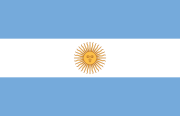 Argentina - FOX Sports
Argentina - FOX Sports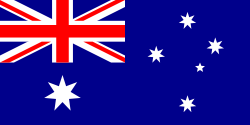 Australia - Setanta Sports Australia
Australia - Setanta Sports Australia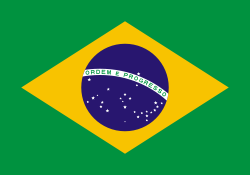 Brazil - SporTV and Rede Globo
Brazil - SporTV and Rede Globo China - CCTV
China - CCTV
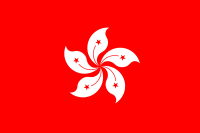 Hong Kong - Cable TV
Hong Kong - Cable TV
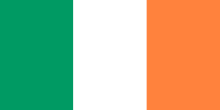 Ireland - Setanta Sports
Ireland - Setanta Sports Mexico - FOX Sports
Mexico - FOX Sports Paraguay - FOX Sports
Paraguay - FOX Sports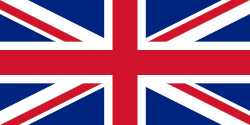 United Kingdom - Setanta Sports
United Kingdom - Setanta Sports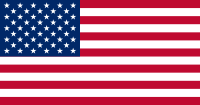 United States - Fox Sports en Español
United States - Fox Sports en Español
See also
- History of the Copa Libertadores
- Records and statistics of the Copa Libertadores
- Copa Libertadores de América Topscorers
- International club competition records
- Copa Sudamericana
- Recopa Sudamericana
- Intercontinental Cup / FIFA Club World Cup
External links
- Copa Santander Libertadores at CONMEBOL.com Official Website.
- Copa Libertadores at ESPNdeportes
- Copa Libertadores results at RSSSF.com
|
International club football
|
|||||||||||||||||||||||
|---|---|---|---|---|---|---|---|---|---|---|---|---|---|---|---|---|---|---|---|---|---|---|---|
|
|||||||||||||||||||||||
|
|||||||||||||||||||||||
|
South American club football competitions
|
|||||||||||||||||||||||
|
|||||||||||||||||||||||
|
Copa Libertadores
|
|||||||||||||||||||||||
|
|||||||||||||||||||||||
